8. Robocop (1987)
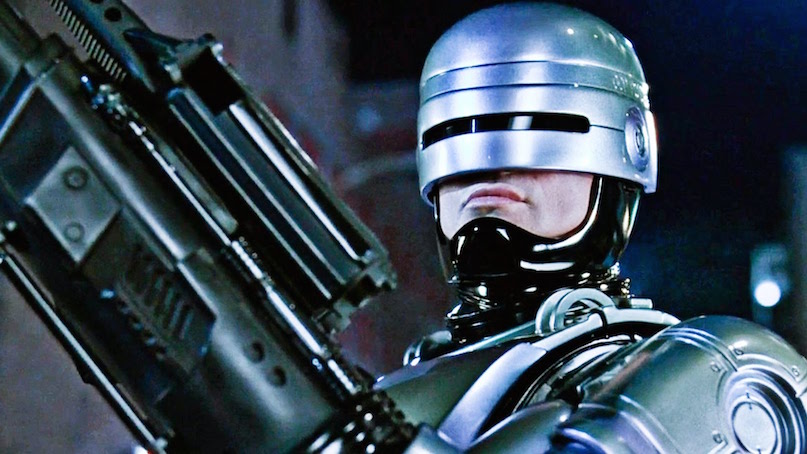
It’s hard to look at Robocop with fresh eyes when it’s become so ingrained in pop culture. Possibly the pinnacle of movies that should not work as well as they do. Verhoeven getting on board to direct Robocop is one of the most bizarre transitions a foreign director has ever made after landing in Hollywood.
For anyone trying to rewatch it with a fresh mind, the film does play very much like a foreigner’s perspective of what Americans went to movies for; blood and guts. If Robocop has a key flaw, it is that watching it today the satire is maybe too on point. The ultra-rich provoking organized crime, consumers becoming increasingly desensitized by 24 hr news, and militarization of the police just don’t feel like that much of an exaggeration anymore.
What is astounding is how well Robocop delivers on both fronts, and offers up a compelling hero’s journey complete with Christian imagery. It still manages to exaggerate what everyone looks for in action film. What’s most underrated about the film is Murphy’s personal life, with the loss of his wife and child that go totally unresolved; there’s a sadness to Peter Weller’s performance as Murphy.
It is easy to forget about amid the blood and guts. Finding the small bits where Murphy regains his humanity is what makes the rewatch rewarding; the society that created Robocop is utterly insane but Murphy’s struggle is treated with sincerity.
7. Showgirls (1990)
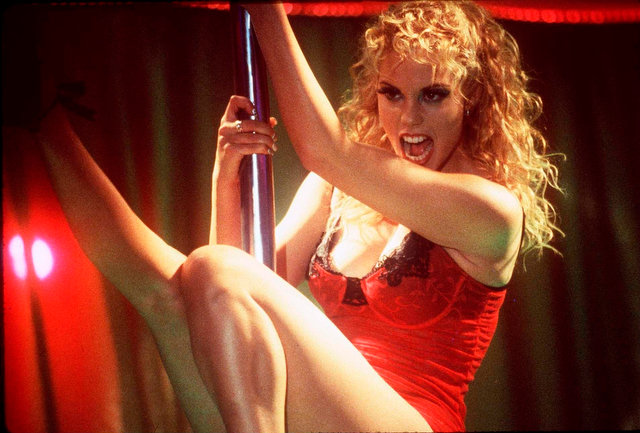
Deep sigh*
Showgirls.
I am not going to argue that Showgirls is great. I am not exactly going to argue that Paul Verhoeven was in on the joke. I won’t even argue that the masses who’ve labeled it as one of those infamously bad movies are wrong. What I will say is the Showgirls reputation should be that it’s just strange, that it is like something made on another planet where they make movies differently.
Showgirls is a re tooled version of every showbiz drama you’ve ever seen only here the whole idea of your dreams coming true becomes uglier and uglier. Maybe the erratic choices by the screenwriter and Elizabeth Berkley were a conscious attempt to depict a world of impossibly screwed up people, or maybe Joe Eszterhas thinks women actually eat dog food sometimes.
Yes, that is in the movie.
Whatever anyone involved with Showgirls was trying to do, the target of the film-Las Vegas substituting for the Hollywood dream factory is hard to miss. Whether it be it chimpanzees, bizarre pool sex, cartoon sound effects or any of the dozens of other absurdities there’s no denying the worldbuilding that emerges from all the muck or the catharsis of seeing our psychotic hero ascend from it. Just watch this if you haven’t already.
6. The Fourth Man (1981)
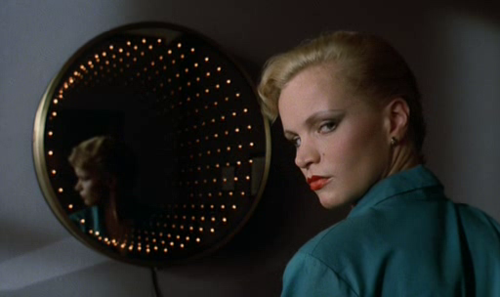
This is Verhoeven’s most religious film. Go ahead throw away any conceptions you might have about religious movies. The Fourth Man is also one of Verhoeven’s funniest works. The story of a disturbed writer played by Jerone Krabbe who becomes sexually entangled with a woman who (according to the director) might be a witch but does so mainly for the purpose of seducing her lover.
Reality and dreams bleed into each other with the full-blown sequences of surrealism and religious imagery as the protagonist’s fears about death, castration and spiders compound. The religious visions Krabbe experiences could have easily read like cheap moralizing if they were not also highly eroticized, misleading and did not come and go as playfully as several of the cut away death scenes.
What’s unique to The Fourth man is how it tackles a theme not seen in many of Verhoeven’s other films, the theme of isolation and loneliness. Krabbe feels empty and longs for others even when he is with company. When left alone he opts to get drunk and watch home movies. The Fourth Man is a pure cinematic depiction of a character being stuck in his own head and in a Verhoeven, film the sacred and the profane sit in the same compartment. It’s still really funny though.
5. Starship Troopers (1997)
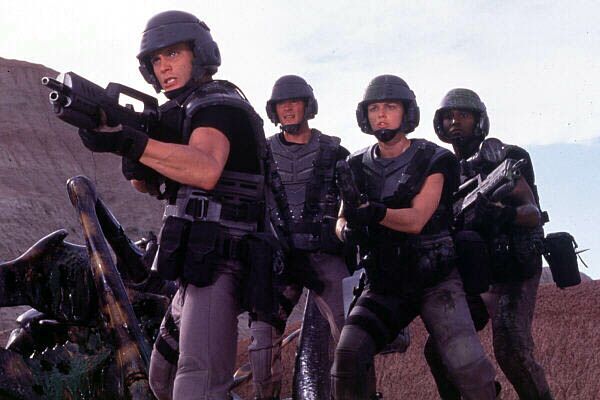
Starship Troopers while it received far better reception than Showgirls still took a while to build up it’s fanbase. Looking back, it’s hard to imagine anyone took the film at face value or thought Verhoeven embraced Heinlein’s ideas. Marketed like a 90’s blockbuster, even Verhoeven’s boldest satire took time for people to wrap their heads around.
The laugh out loud depictions of propaganda and repeated allusions to Nazi Germany are pretty hard to miss yet lots of Starship Troopers subtler jokes have maybe become more apparent in recent years thanks to shifting political climates.
Verhoeven directs some of his best action sequences so sleekly it’s easy to forget that the war with bugs never comes to an end and that our heroes are really trapped in a never-ending conflict. Additionally, Verhoeven seems to be having the most fun trivializing personal dramas and romances between Johnny and Denise Richards Carmen.
Their school yard love triangle plays like something out of Archie comics and film’s harshest kick to the pants is the reminder that these goofy All-American (or all-Aryan) kids will probably be reduced to “fresh meat for the grinder” but what can they do? They just want to become citizens.
4. Elle (2016)
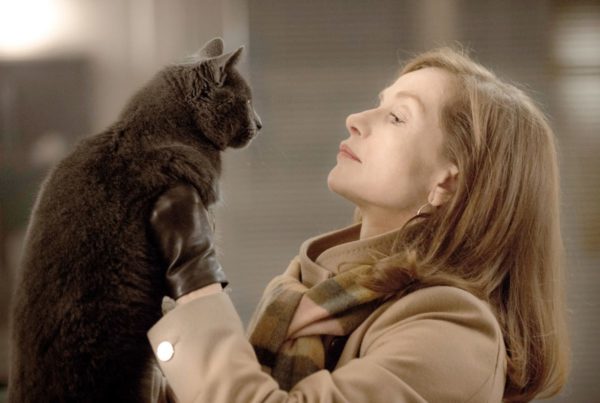
This year’s Oscars were a step in the right direction in many regards but the lack of representation for Elle illustrated the director still hasn’t won over the Hollywood elites yet. Elle may not be Verhoeven’s best film, but it certainly feels like a culmination of everything that’s happened before. Framed like a rape revenge story Elle takes a far more modern approach towards the violence going to great lengths to establish its leading lady outside of her traumatic experience.
Huppert’s character is in many situations at odds with those around her, on the surface she’s antagonistic with almost all the supporting characters including her mother, son and ex-husband.
The various roles that Huppert has to take on, often playing babysitter for the same people who irritate her plays like commentary on the roles we’re obliged to keep up to function in society even if it means accepting taking abuse in stride. Huppert’s character after all has also had to adapt to accepting the role of a serial killer’s daughter on top of everything else.
Elle takes the clichés surrounding the ideas of what it means to be a victim, all while endowing the abused with a set of character traits would inspire scorn in any other film. Elle never veers in the expected direction and is testament to Verhoeven still being surprising as ever even after all these years.
3. Turkish Delight (1973)
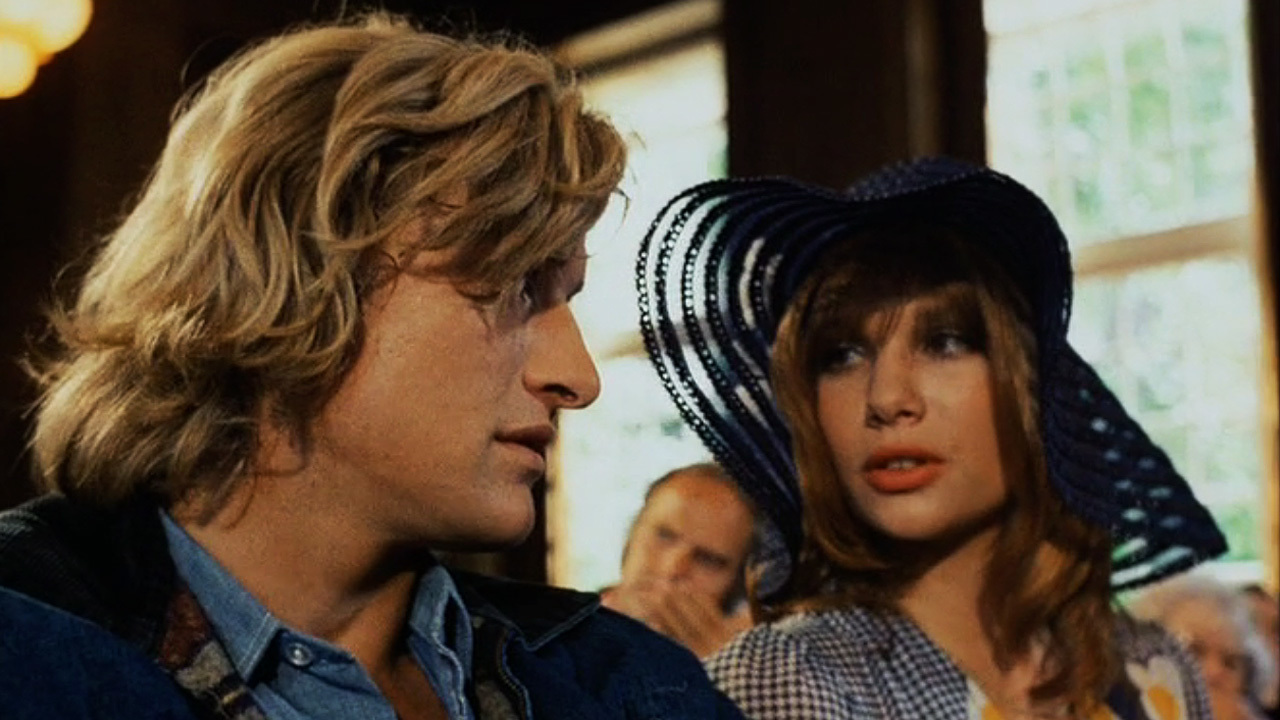
One of Verhoeven’s earliest works probably could have been a high art work of eroticism; but Verhoeven has said his main attraction to the material was simply wanting to do something funny with sex.
Turkish Delight follows the misadventures of a young couple in his first collaboration with Rutger Hauer who plays a bohemian artist. Verhoeven captures the couple’s early encounters with breakneck looseness and plays most of the eroticism as slapstick. Verhoeven’s most new wavey film blurring the sequence of events early on with a flashback structure, dream sequences and staggering shifts in tone.
Turkish Delight is one of the purest distillations of Verhoeven’s energy. Literalizing the pain from a broken relationship with murderous dream sequences, and chronicling Hauer’s sexual exploits as method of coping with depression only to bring everything to halt with an emotional gut punch.
Turkish Delight feels most at odds with his later American output, partially because the love story is something he has never revisited. Maybe he didn’t need to as it stands Turkish Delight already plays like a twisted version of any number of romantic comedies that never needed an updated version as something like Soldier of Orange did.
2. Black Book (2006)
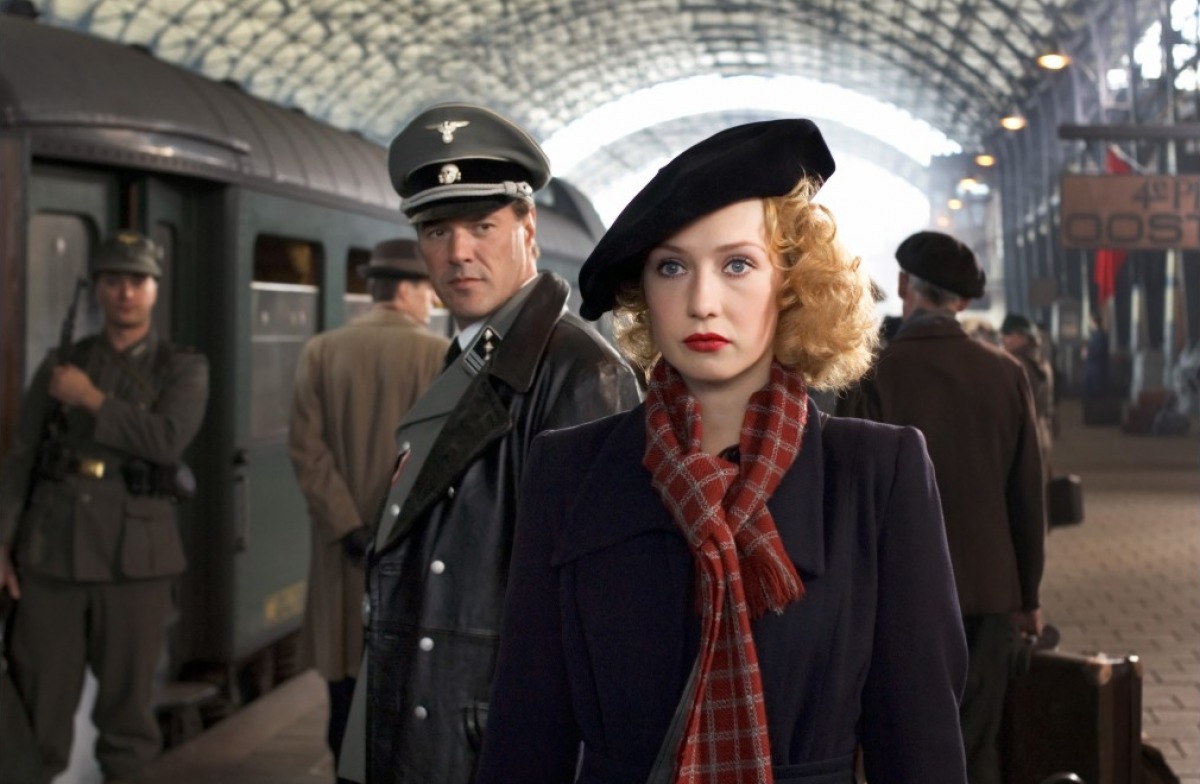
After Hollow Man went out with a whimper, Verhoeven returned to the idea he’s been nursing for most of his career. With Black Book he would re-visit events he’d addressed in Soldier of Orange.
The difference with Black Book is the impact Hollywood had on him; Black Book is a faster paced, more all-encompassing film, through a female lead he’s able to better examine the sexual politics of war. The film taps into complexities most war films might overlook with sympathetic Nazis and members of the Dutch resistance being anti sematic.
The most exciting part of Black Book is how Verhoeven manages to invoke a sense of Hollywood glamour in the most desperate situations. Van Houten’s performance as Jewish singer exudes the mystique of a starlet (she’s compared to Greta Garbo and Jean Harlow); except she is constantly dragged through the mud. Black Book drop kicks the ideas of victory manufacture by most war films and illustrates the brutality of the lasting impact of oppression.
1. Total Recall (1990)
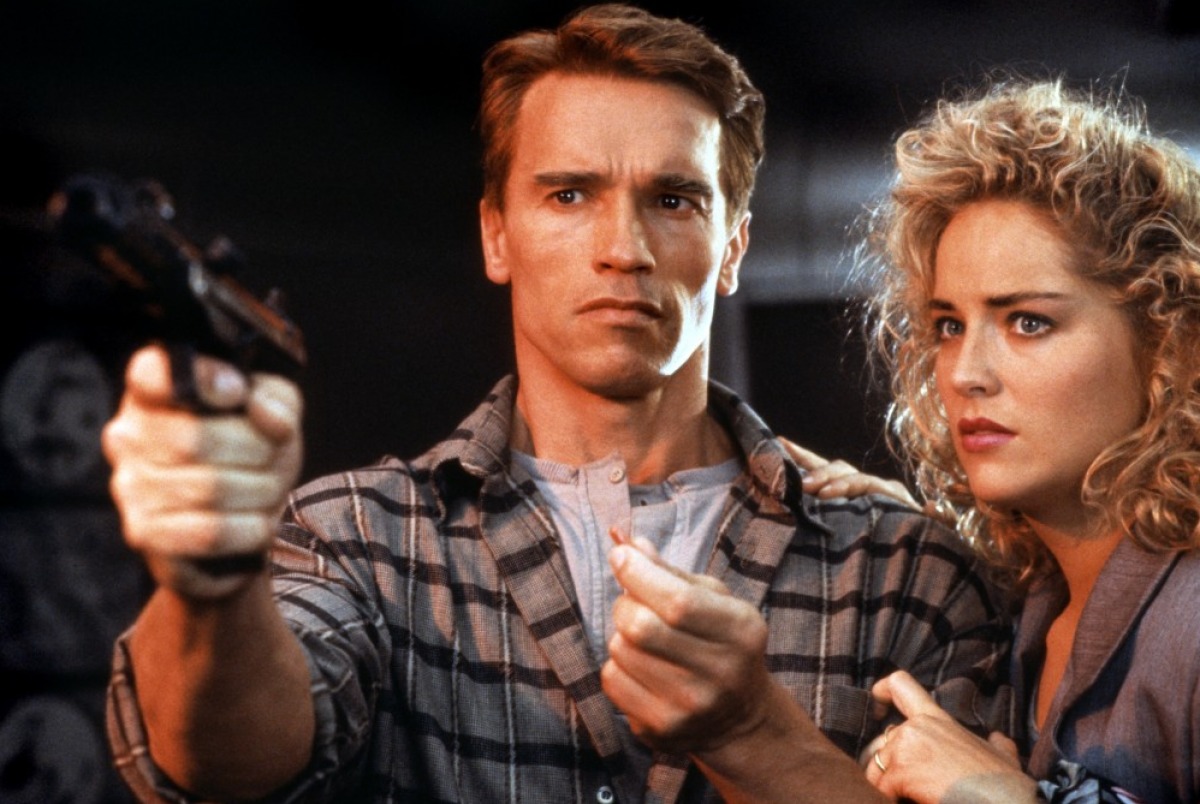
It seems insane that Arnold Schwarzenegger was so invested in a Philip K. Dick adaptation to begin with, let alone that he personally tracked Verhoeven down after being impressed with his earlier work. Verhoeven had several phases of his career and Total Recall is the greatest synthesis of his Hollywood work and European weirdness.
Total Recall has a less specific satirical target than Starship Troopers or Robocop, but it’s certainly fascinated with certain American ideas specifically it his highly self-conscious take on the movie going experience. The idea that Schwarzenegger’s Doug Quaid gets to embody the shoes of someone more exciting is pitch to him just like a summer blockbuster underscores the whole movie.
Verhoeven’s traits as a controversial satirist actually work in the service of making Total Recall the action free for all it is. Structurally, the kineticism from his Dutch work translates to action filmmaking, pacing much of film like an amusement park ride, and cuts exposition down to a minimum. The violence seen in Robocop is even more pronounced here and it’s more impactful, there is an extra reminder that civilians can be caught in crossfires.
It’s even more notable how the movie uses quotable dialogue to engrain violence in memory, since the movie’s most quoted lines are uttered after sequences of graphic violence “consider that a divorce” caps off Sharon Stone being shot in the head. Verhoeven also seems delighted to revel in the filmmaking process as Total Recall was one of the last films of its kind to utilize miniatures; to evoke a kind of moving magic that’s now a thing of a past as well as look forward being one of the first to utilize CGI.
Finally, consider the use of Arnold himself and the offbeat idea that he’s in the guise of a regular guy who’s rarely in control and made to look ridiculous. Too much is made about whether the events of Total Recall are a dream or not.
What’s really at stake is the idea that Quaid is potentially nobody, just a bunch of memories of a man who never existed. The key to Total Recall lies in the movie’s most underrated sequence where the mutant revolutionary Kuato induces a vision that utilizes many of the film’s practical sets to hint to Quaid that he is defined by his actions, and not his memories.
Verhoeven spends all of Total Recall giving the audience the greatest bang for their buck with violence, snappy exchanges and all sorts of movie magic but here more than anywhere he comments on the medium itself and at the heart of all the crazy nonsense. These smaller moments in Total Recall bring to light what we go to the movies for, what they say about who we are and who we’d like to be.
Author Bio: Greg is a comedian based in New York City. Greg also has a degree in film theory and is always searching searching for ways to make people laugh while referencing movies.